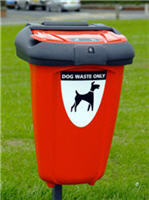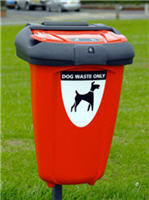
DNA Lab Aims to Reduce Your Pet's Carbon Footprint
- By Christina Miralla
- Oct 24, 2011

There’s an unsuspecting culprit contributing to U.S. water pollution: pet poop.
There was a time when pet owners could walk their dog and leave the animal’s droppings wherever it landed - it was good for soil once upon a time. However, those age-old tales don’t apply to the 21st century with the pet population nearly doubled in the past two to three decades. As of 2006, there were more than 72 million pet dogs in the United States and nearly 82 million pet cats, according to the American Veterinary Medical Association – which doesn’t even include strays.
In the Unites States, pet waste can be a major source of bacteria and excess nutrients in local waterways. Organisms such as Cryptosporidium, Giardia lamblia, Salmonella and viral strains of E. coli are associated with animal waste pathogens that can infect humans or cause serious illness, according to the EPA; while approximately 40 percent or 2.5 billion pounds of pet waste is never picked up by owners. The un-disposed waste then trickles into waterways, thus, polluting natural resources that affect humans and wildlife.
In Knoxville, Tenn., one DNA testing laboratory for veterinarians aims to resolve the nation’s pesky pet poop problem with its green initiative promoting education, awareness and environmental protection – starting with dog waste. BioPet Vet Lab opened in 2008 with the hopes of developing a string of products that revolve around reducing the pet carbon footprint – the preliminary stage focuses on pooper scooper violators.
“This is not fertilizer anymore,” said Eric Mayer, business development director at BioPet Vet Lab. “This does seep into the water system. It can evaporate and the bacteria can become airborne and affect our air quality as well, and accounts for a very large percentage of bacteria pollutants that are found in water. Of course, this does affect wildlife and that downstream affects people as well.”
Mayer states after years of research, the lab found that dogs are designed to eat anything in their digestive systems – adding the fact that owners feed them processed foods, they’ve got more intestinal bacteria than other pets.
“[dog poop] it’s actually worse on a per gram basis than cows, horses, or rabbits,” Mayer said.
One of its recent products, PooPrints, opens the door for conversation about the effects dog waste has on the environment.
PooPrints was in development for nearly three years before it launched in early 2011. Now, apartment complexes and housing associations in the Knoxville area have implemented this service for community residents - even out-of-state housing communities. Currently, 40-50 locations throughout the United States offer PooPrints.
Pet owners can collect pet DNA with a simple cheek swab and mail the sample to BioPet Vet Lab – then, the data is uploaded into the specific property’s database registry. If a pet owner wants to be a part of the PooPrints program, they can request a PooPrints Sample Collection Kit, collect a marble-sized amount of the dog dropping and return it to the BioPet Vet Lab in a leak-proof container for analysis – this can even be done for pet owners that reside outside of the Knox County area. In one to two weeks, the lab will send an email with the unique pet identification number matching the sample, along with a green dog tag for the pet.
“People can voluntarily pledge a sample of their pet’s DNA, volunteering to be enrolled in the system and claim responsibility for cleaning up after their dog,” Mayer said. “They’re saying I’m a green, clean, responsible pet owner and I’m proving that by giving you a sample of my dog’s DNA to add it into the system.”
DNA registration costs about $30 and analysis costs $60 with a portion of the proceeds donated to nonprofits. One of the first nonprofit partnerships in this program was fostered with the Ijams Nature Center in Knoxville, Tenn.
Mayer insists the DNA registration database has the potential to replace the microchip and is now the best way to prove pet identification in lost and found situations, aside from hunting down fido's owner.
“Our Poo Prints product itself is designed for tighter communities whether they are apartments or condos or HOAs and that really does rely on building the community database to clean up the common areas, clean up the grounds within those communities,” Mayer said.
Many communities throughout the U.S. do have pooper-scooper ordinances in effect, but BioPet Vet Lab hopes to influence the pet owner community before nationwide mandates are implemented.
“The EPA are involved and studying this issue, we want to make sure that pet owners are encouraged to do the right thing and take responsibility before mandates are handed down at a higher level,” Mayer said.
The EPA suggests the best method of pet waste disposal is by flushing it down the toilet, and wastewater systems will negate harmful bacteria before the water reaches humans or wildlife.
About the Author
Christina Miralla is the associate content editor for 1105 Media, Inc. She can be reached at [email protected].